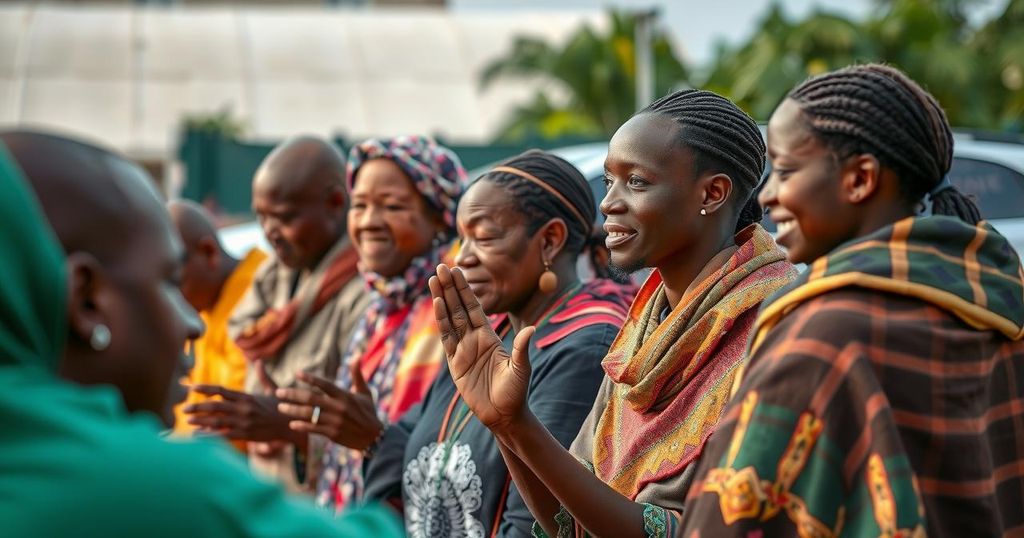Building Peace in Ituri: Local Initiatives Amidst Conflict in DRC

In Ituri, DRC, prolonged inter-ethnic conflict between the Lendu and Hema communities has persisted for over a decade, catalyzed by competition for resources and instability. Despite this, local peace initiatives are emerging, highlighting community resilience. Efforts involve former combatants like Elle Alphonsine Cecile and Ngabu Jospin, who advocate for dialogue and coexistence. The DRC government’s multi-faceted approach combines military actions with socio-economic reintegration. However, significant challenges remain, including distrust in institutions and ongoing violence, necessitating strengthened governance and support for grassroots movements.
In the eastern province of Ituri, Democratic Republic of Congo (DRC), prolonged inter-ethnic strife has persisted for over a decade, primarily involving the Lendu and Hema communities. This discord, exacerbated by political instability and external influences, has led to significant violence and suffering. Nonetheless, local reconciliation efforts have emerged, reflecting the resilience and hope of the population. These initiatives, spearheaded by both individuals and organizations, aim to foster unity and healing among communities historically torn apart by conflict.
Historically, the conflict in Ituri can be traced back decades due to fundamental differences between the Hema, primarily herders, and the Lendu, mainly farmers. Competition over land and resources intensified amid the broader instability following late 20th-century wars in the DRC. Additionally, Ituri’s rich mineral resources have drawn both national and international interests, often manipulating these existing tensions for easier access to valuable assets. As state authority eroded in certain regions, youth were easily coerced into armed groups as defensive measures for their communities.
In response, various local initiatives have surfaced to promote peace and reconciliation. Among these is the story of Elle Alphonsine Cecile, a former combatant who, at just 22 years old, expressed her regret over past violent actions, stating, “It was the absence of peace that drove us to take up arms. I saw my loved ones being killed, which aroused in me a deep sense of revolt.” This sentiment reflects a growing acknowledgment that true peace is achievable through collaboration and dialogue among previous adversaries.
Community-led initiatives are increasingly recognized as vital as they create safe spaces for inter-community dialogues, allowing former enemies to converge, share experiences, and prevent further violence. Young individuals such as Cecile and fellow ex-combatant Ngabu Jospin are not only advocating for peace but are also actively engaged in projects promoting coexistence and trust through development activities. Jospin emphasized the importance of unity by stating, “Peaceful coexistence is better than unnecessary conflicts that plague the region.”
The Congolese government and international organizations are concurrently pursuing a multifaceted approach to reinstate peace, incorporating military action against armed factions, disarmament, and socio-economic revitalization programs. Security operations have successfully liberated various regions, enabling community members from different backgrounds to collaborate for their collective welfare. Local officials are seeing renewed cooperation among formerly hostile groups, which fosters hope for sustainable peace.
Despite these advances, Ituri continues to grapple with considerable obstacles, including sporadic violence stemming from ethnic tensions and humanitarian crises characterized by food scarcity and lack of medical care. Distrust in state institutions remains a significant challenge, as ineffective governance exacerbates the community’s plight. Therefore, it is imperative to restore state authority and instill effective governance to anchor a peaceful future in Ituri.
In addition to governmental and military solutions, grassroots movements play a crucial role in fostering reconciliation. Organizations like the Union des associations culturelles pour le développement de l’Ituri are committed to breaking down ethnic prejudices through community engagement initiatives. Similarly, women’s groups have emerged as pivotal players, transforming their traumatic experiences into a force for progress.
For Ituri to evolve into a beacon of peace, comprehensive national and international support is essential. This includes establishing transitional justice frameworks to address historical grievances, enhancing state presence, and facilitating equitable resource management. Although formidable challenges still exist, the efforts of engaged citizens like Cecile and Jospin illuminate a path towards hope and renewal, paving the way for Ituri to redefine its identity as a model of resilience and peace in Central Africa.
The Democratic Republic of Congo has faced ongoing conflicts, with the eastern province of Ituri standing out due to its severe inter-ethnic violence between the Lendu and Hema communities. These conflicts, rooted in historical rivalries over land and resources, have been fueled by broader political instability and foreign interests in the region’s mineral wealth. Amidst the turmoil, a resurgence of grassroot reconciliation efforts has emerged, emphasizing local agency and community resilience in striving for peace and unity.
The intricate dynamics of conflict in Ituri, marked by historical grievances and external pressures, illustrate the challenges to peace in the region. However, the commitment of local communities to engage in dialogue and reconciliation demonstrates the potential for a transformative journey towards stability. By strengthening local governance, promoting inclusive development, and addressing past grievances, Ituri can gradually evolve from a landscape of conflict into a harmonious community ideal, showcasing resilience amidst adversity.
Original Source: peacenews.com








